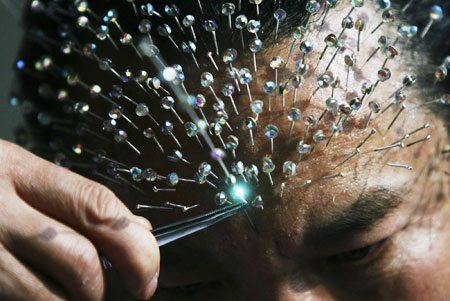Month: June 2010
No Education? No Training? No License? No Problem!
When Daniel David Palmer, the inventor of chiropractic, and his acolytes first took up the practice of chiropractic, around the turn of the last century, they were jailed for the unlicensed practice of medicine. If history had left them there, we might not be fighting a continuing battle with the pseudoscience that is “alternative” medicine today. Unfortunately, the Kansas legislature intervened on...
Certainty versus knowledge in medicine
I don’t want knowledge. I want certainty! — David Bowie, from Law (Earthlings on Fire) If there’s a trait among humans that seems universal, it appears to be an unquenchable thirst for certainty. It is likely to be a major force that drives people into the arms of religion, even radical religions that have clearly irrational views, such as the idea that...
Mumps
I write this post with a great deal of trepidation. The last time I perused the Medical Voices website I found nine questions that needed answering. So I answered them. One of the consequences of that blog entry was the promise that Medical Voices was poised to “tear my arguments to shreds.” Tear to shreds! Such a painful metaphor. They specified that...
What Do You Expect From Your Pharmacy?
What evidence standard should exist for health products sold in pharmacies? That’s today’s bleg, and I’m seeking your input. In most countries, pharmacy is a registered, self-regulated health profession, with a responsibility to optimize the use of drugs. Pharmacist education consists of several years of university-level education and practical training in real-world health care settings. Pharmacists with advanced degrees and post-graduate residencies...
Narcotic treatment contracts and the state of the evidence
Opium derivatives—and later, synthetic opioids—have probably been used for millennia for the relief of pain. Given human biology, they’ve probably been abused for just as long. Opiate use disorders are a daily fact for primary care physicians; the use of these drugs has become more and more common for chronic non-cancer pain. These medications are very effective in the treatment of pain,...

Another overhyped acupuncture study misinterpreted
Perhaps the most heavily studied of “alternative medicine” modalities is acupuncture. Although it’s hard to be sure as to the reason, I tend to speculate that part of the appeal to trying to do research in this area is because acupuncture is among the most popular of actual “alt-med” modalities, as opposed to science-based medical modalities co-opted by believers in alt-med and...
Potential New Mechanism of Pain Relief Discovered
The development of drugs and other treatments for specific symptoms or conditions relies heavily on either serendipity (the chance finding of a beneficial effect) or on an understanding of underlying mechanisms. In pain, for example, there are limited ways in which we can block pain signals – such as activating opiate receptors or inhibiting prostaglandins. There are only so many ways in...
The Weekly Waluation of the Weasel Words of Woo #10
The W^5/2 Hits Double Figyiz! OK, I gotta admit that my friend Orac moved me to render this Special 10th Edition of the W^5/2™ (after a brief hiatus) by mentioning it today in the context of an article that used, er, the topic of our venerable game to great advantage! Some of it is brilliant, unprecedented even: Perhaps most tellingly, the U.S....

